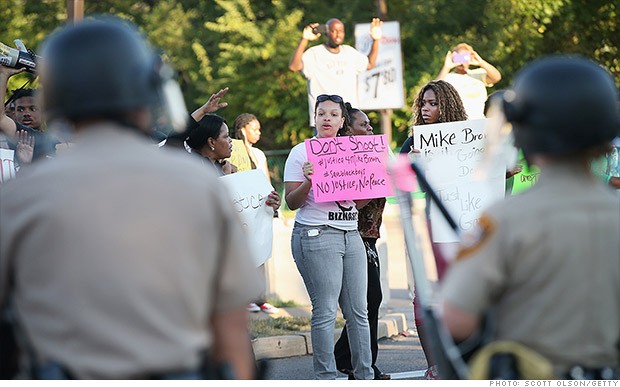
Like many Americans, I watched St. Louis County prosecutor Robert McCulloch make his announcement on television Monday night regarding the Michael Brown/Darren Wilson case. And like many Americans, I wasn’t surprised that the grand jury decided not to indict police officer Darren Wilson, nor was I surprised at the unrest that followed.
The signs had been clear. For days in advance of the announcement, we’d heard and read stories about an increased police and National Guard presence in St. Louis. The Ku Klux Klan had announced they’d be there to help stir the pot. Protestors had been organizing for weeks. The kettle was simmering, just waiting for the heat to be kicked up a notch. McCulloch’s announcement was all that was needed.
As any lawyer will tell you, prosecutors use grand juries to build a case for indictment, which sends the case to trial. They are not obligated to present both sides of the story, and they seldom do. And it is a rare grand jury that does not indict when presented with prosecutorial evidence. For example, prosecutors at the federal level pursued more than 160,000 cases in 2009-2010 (the most recent available data), and grand juries voted not to return an indictment in 11 cases. If a prosecutor wants a grand jury to indict, they will, literally 99.9 percent of the time.
It was quite apparent, given his long recitation of evidence supporting Wilson’s story, that McCulloch did not want to prosecute. And it’s true, police have the right under law to shoot to kill if they feel their safety or the safety of others is threatened. That’s pretty much a “get-out-of-prosecution-free” card, unless there’s strong evidence to the contrary, especially given the symbiotic relationship between prosecutors and police.
There’s a reason those photo-ops for drug busts and gang arrests always feature the district attorney and the police chief standing side by side. Cops need the district attorney to validate their arrests by prosecuting the offenders, and district attorneys need cops to testify in their prosecutions.
So why go through the charade? Why not just say there wasn’t enough evidence to prosecute? And why, for heaven’s sake, would you make the announcement at 8:30 p.m., when crowds are most likely to be able to gather and when darkness provides cover for looters, making the situation more dangerous for the police, businesses, legitimate protestors, and citizens just wanting to stay safe in their homes? Wouldn’t common sense suggest a better time might be, say, 8:30 a.m.?
There are many questions lingering around this story, and many witnesses and much evidence that will never see a courtroom, and that’s where the frustration comes from. It’s possible that Wilson’s story would have held up in court, and it’s also possible that a forthright prosecutor could have torn holes in his story. Now we’ll never know. The truth is lost in the fire and tear gas and darkness of night.
 St. Louis Public Radio
St. Louis Public Radio